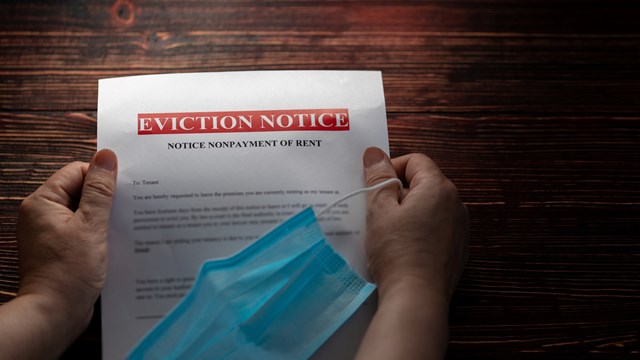One person’s music can be a neighbor’s menace. When people live in close proximity (think of your college roommate) there’s the possibility of noise as an issue. The closer the living quarters, the greater the potential for problems. Homes in multi-unit condominium buildings, by their very nature, require more noise control than detached residences.
Of course, there’s a certain amount of noise in shared living space that has to be tolerated. “People walking on floors, kids playing, television, music, are a part of daily life,” says Rick Stern, president of Sutton Management in North Andover, Massachusetts, which manages approximately 30 associations and 2,500 units in a perimeter running from Salem, New Hampshire to Lowell and Ipswich, Massachusetts. “Rules can be put in place to keep these issues to a minimum,” says Stern.
Mark Mediate, president and CEO of Mediate Management in Charlestown, Massachusetts also mentions the issue of people walking on floors, and notes that the issue can be structural. “Older buildings may have less insulation between floors,” says Mediate, whose company manages about 3,000 units in Greater Boston as far west as Concord, Massachusetts.
Lifestyle issues are also a factor, according to Ronald Barba, an attorney and partner at the law firm of Bender, Anderson and Barba, P.C. in Hamden, Connecticut. He highlights several types of situations where noise can be an issue: “Someone works at night and arrives home late at night; older children of condo owners living at home because they can’t afford their own place and play loud music; older folks who have trouble hearing and play the television too loud; loud music from tenants not familiar with the association’s rules. There are also people who are in a protected legal class, such as special needs children.”
“Service dogs prescribed for people for emotional issues can sometimes be a sticky issue,” according to Chris Deorocki, an attorney in Amesbury, Massachusetts who represents 10 condo associations with 190 units. “Sometimes people leave the dog at home when they go to work. Associations have to take into account people’s medical needs,” says Deorocki, “but not to the detriment of other people.”
“Sometimes the existence of service dogs for emotional issues creates controversy,” agrees attorney Michael R. Feniger, an attorney with the law firm of Feniger & Uliasz LLP, of Manchester, New Hampshire.
There are times when the issue can be inside the box—literally. Feniger recalls a condo controversy over an air conditioning unit that an owner attached to a deck, creating noise that bothered other residents.
Enforcing the Rules
Feniger notes that most of these issues are dealt with by management companies. “Noise can be very subjective,” observes Mediate. “Associations have to deal with a range of responses to noise. Some people are noise-sensitive. Sometimes it helps to read the noise decibels. Once a unit owner complained that you can hear noise in the next apartment if you put your ear to the wall. Obviously, that’s unreasonable.” Mediate feels that many of these issues can be dealt with on an individual basis. “There is often no flat answer. The fewer rules the better,” he says. “But sometimes associations will develop rules if problems have occurred.” He notes that breaking the rules can then lead to a warning, and, if necessary, a fine.
Stern believes that rules should be written in a way that keeps problems of noise to a minimum.
“Noise becomes excessive when it is disturbing to adjacent owners,” he says. “To create less subjectivity, complaints have to be verified by at least one additional owner. If more than one owner complains, a warning goes out and if ignored, a fine is issued. Residents can also contact the police to complain about excessive noise and the board gets a copy of the police report for verification.”
What happens if a tenant is the subject of a noise complaint? Both Mediate and Stern point out that at the complaint stage, the association deals with the owner. “Any warnings or fines are levied on the owner,” says Stern. If a tenant is uncooperative and the issue reaches the litigation stage, a condo board can step into the role of the unit owner and bring eviction proceedings, according to Barba. .
Stern has helped Sutton Management’s associations by developing a template for noise control. In it, rules state that: “Excessive noise within the condominium, disturbing residents of adjacent units is not acceptable. Violation, $50.”
Additionally, excessive noise “can result in a warning notification letter. Violators will be afforded one week to institute corrective measures after notification of the infraction.” Further, the document states that “no fine will be assessed without a verification of the time and nature of the offense in writing from an identified individual. Notifications from anonymous sources will not be deemed acceptable. Assessment of a fine requires the approval of at least three members of the Board of Directors.”
Sutton Management also has created a template for floor covering replacements. Often, the age of the rough flooring causes squeaks that can result in noise just from people walking. When a unit owner replaces floor covering in the unit, it’s the responsibility of the owner to give notice to the management company. The management provides a repair contractor to repair the rough flooring and the association pays for the repairs. The unit owner is responsible for the disposal of the old finished flooring as well as the installation of the newly-installed finished floor. The owner has the responsibility to give notice to the property manager prior to replacing the finished flooring to give the management company time to do the repairs. Failure to give timely notice can result in the imposition of a $1,000 fine, which can be rescinded if the owner corrects the problem within 60 days.
Stern says that rules can be added or amended at the owners’ annual meeting for the association.
While owners have an opportunity to give input, the decisions on rules changes are made by the board of directors alone.
It’s the Law
Boards in Massachusetts are given the authorization to impose and enforce fines through the so called “super lien” statute under Massachusetts General Law Chapter 183A. A super lien is a provision that gives condominium associations and HOAs the first priority after municipal/tax liens to the assets or collateral which the property holds—allowing the association to initiate foreclosure. Deorocki says that most condo associations pass amendments as to what owner assessments get paid first. “It’s usually fees, fines and collections and the remainder goes to condo fees. If these are not paid, the association can place a lien on the unit,” according to Deorocki.
In Connecticut, boards have authorization to impose fines for noise and other violations. “A warning letter from the property manager usually works,” says Barba. “If that doesn’t work, the attorney sends a letter under Chapter 47-244 Section 11 of the Connecticut Statutes. Notice of the violation has to be sent and the unit owner is entitled to an opportunity to be heard before the association’s board of directors. If the unit owner is not responsive to the complaint, the board can assess a fine of $25 per incident. This is not large. It’s more to get the owner’s attention. If the fine isn’t paid, a standard late fee of $50 can be imposed. This is not for revenue but to create a disincentive to ignore the problem.”
If the cause of the noise violation is a tenant of the owner, the process is more involved. “Since the tenant has no standing before the board,” explains Barba, “the notice is sent to the owner. The unit owner gets the hearing but he has to do something about the tenant.” Barba points out that any legal action other than fines requires a notice of another hearing under Chapter 47-278 Section C-1-A.
The board can initiate eviction through the courts if the tenant doesn’t cooperate, according to Barba. The board has to send a decision letter within 30 days of the decision. A notice is then given to the tenant, with 15 days to fix the problem If the problem isn’t corrected, the board can proceed with eviction action through the courts. If there is no noise after the problem is fixed, the board can’t proceed. However, if the noise recurs within six months, the board can proceed with the notice to quit.
“Courts use a reasonable standard to determine if noise interferes with the loss of quiet enjoyment,” says Barba. “They give deference to a board’s judgment.” Nevertheless, as the lawyers are quick to point out, it’s best for everyone involved to try to resolve these disputes outside the legal system. “Sometimes it’s an issue of medical people working and returning home late at night,” says Barba. “Or an issue involving special needs. The law firm can try to mediate or sometimes an outside mediator is called for.” Feniger concurs. ”The legal system can be the worst way to resolve these disputes. Everyone loses money,” he notes.
‘Sometimes noise disputes can be resolved with creative problem solving,” says Barba. “If someone hears noise from the above floor, extra carpeting in the above unit may solve the problem. If someone is playing television too loud because of hearing problems, getting a set of headphones can help.” While the issue of a service dog left at home and barking can be a “sticky issue,” according to Deorocki, “sometimes the matter can be solved with a different service dog.”
Unlike the air conditioner on the deck that went to litigation, sometimes noise problems can be solved outside the box.
Leonard Golder is a freelance writer and a frequent contributor to New England Condominium.







Leave a Comment